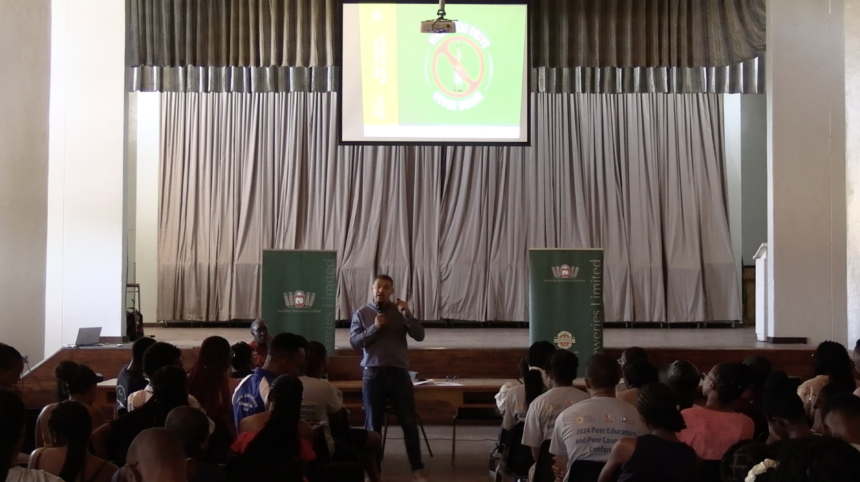Namibia Breweries Limited (NBL) and the University of Namibia (Unam) are teaming up to tackle the growing problem of alcohol abuse among university students. In a bid to promote responsible drinking, the two institutions have launched an innovative peer education program aimed at raising awareness about the risks of excessive alcohol use and encouraging moderation.
The initiative officially kicked off earlier this month at Unam’s Annual Christmas in October event, and its impact is expected to be far-reaching. Over the next year, the programme will focus on training student counsellors and peer educators who will work with their fellow students to spread the message about making healthier choices when it comes to alcohol consumption.
But this isn’t just about handing out leaflets or giving lectures. The real goal is to foster open, honest conversations among students, creating a space where they can talk freely about their habits and make informed decisions in a supportive environment.
Why peer education works
Rita Musialike, a student counsellor at Unam’s Katima Mulilo campus, believes peer education is key to making this programme a success. “This is a big step forward because it helps students realize that they don’t always know what responsible drinking looks like,” she said. “When a company like NBL steps in and gives real, practical advice, students are better equipped to make decisions that will stick with them long after they leave university.”
Musialike also pointed out that students tend to be more open with their peers than with authority figures. That’s why peer educators—students who understand the pressures of university life—are in the best position to connect with their classmates on this issue. “It’s about creating an atmosphere where students can talk to each other without fear of judgment,” she added.
The impact of alcohol on students’ lives
The need for this programme couldn’t be more urgent. Alcohol abuse is a growing concern on university campuses, and the consequences are severe. Kamu Muezako, a peer educator from Unam’s Khomasdal campus, has seen the negative effects up close. “I’ve seen so many students struggle because of alcohol—especially those living in hostels,” he shared. “They miss classes because they’re hangover, their grades drop, and some even end up dropping out. Alcohol also takes a serious toll on their health. I’ve seen students end up in the hospital because of drinking.”
But Muezako is quick to point out that the problems go beyond academics and health. “When students fail and drop out, it doesn’t just affect their education—it has a ripple effect on their future. They lose financial support, and many end up stuck in the cycle of unemployment,” he said.
Muezako also highlighted a key issue that often goes unnoticed: alcohol and personal safety. “It’s especially risky for young women. Sometimes when you’re drinking without money, you end up in vulnerable situations—getting involved with strangers who buy your drinks. This can lead to unsafe sexual encounters and the increased risk of HIV/AIDS.”
Training peer counsellors for lasting change
The peer counsellor training has already begun, with nearly 200 counsellors and educators attending the first “Train the Trainer” session in December. Rejoice // Owases, a peer counsellor from UNAM’s Oshakati campus, is excited about what’s to come. “We already have a lot of contact with our peers as counsellors, so we’re in a great position to help them make better choices,” //Owases said. “This training is giving us the tools to really guide students in the right direction. We’re looking forward to putting what we’ve learned into action.”
The training focuses not just on how to talk about alcohol, but also on how to spot when drinking becomes a problem. Johannes Epoche, a peer counsellor from the Neudamm campus, explained that there are different types of drinkers: moderate drinkers, binge drinkers, and alcoholics. “The key is learning how to manage your drinking,” Epoche said. “Things like setting limits, planning ahead, or making sure one person stays sober when you go out with friends can really help.”
Epoche also emphasised the importance of recognising the signs that alcohol use has become problematic. “If drinking becomes part of your daily routine, or you find you can’t function without it, that’s a red flag. Also, if you’re always running out of money because of drinking, it might be time to take a step back,” he said. “Talking to someone, whether it’s a counsellor or a friend, can help you get a clearer perspective on your drinking.”
Addressing the bigger picture
While this peer education initiative is a crucial first step, experts agree that a broader approach is needed to tackle alcohol abuse among university students. Many students drink to cope with stress, mental health issues, or social pressures—and addressing these root causes is just as important as educating them about the risks of alcohol.
This initiative is just the beginning of a larger conversation about the challenges that students face and how to support them in making healthier choices. Resources such as professional counsellors, social workers, and organisations like the ministry of gender and social welfare are available to help students who may need additional support.
Looking ahead
The partnership between NBL and Unam is expected to have a lasting impact on Namibia’s student community. With plans to expand the program to all 12 Unam campuses across the country, the initiative aims to create a network of peer educators who will help spread the message of responsible drinking to as many students as possible.
As Musialike sums it up, “What’s great about this programme is that it’s not just about teaching students about responsible drinking—it’s about empowering them to pass that knowledge on to others.
This way, the impact will continue long after the program ends.”


